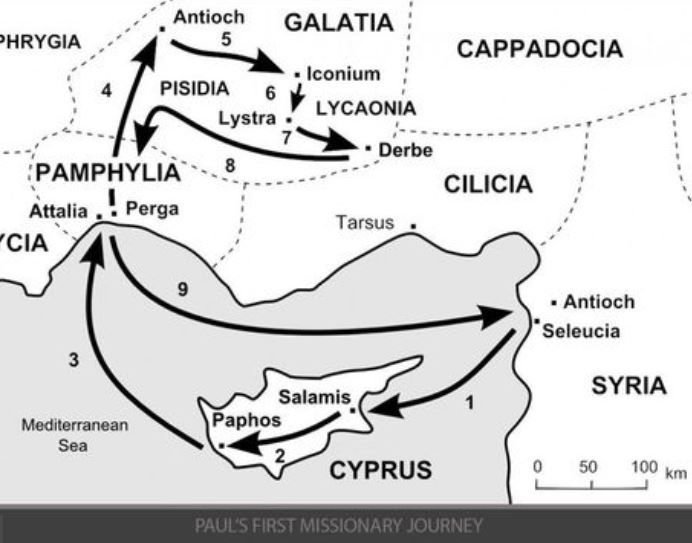
Good morning friends,
Today is a significant day in our Scripture reading journey… we’re focusing on Acts chapter 19, but I’d like to also take a little pause to gain perspective on our journey thus far which began May 1.
The first 8 chapters of Acts are spectacular and describe the amazing and explosive growth of the spiritual movement of Jesus followers, led primarily by the Apostles Peter, John and James, and other of Jesus’ disciples. It is almost a breathtaking 8 chapters!
In Acts 8 we encounter a Jewish Rabbi known as Saul of Tarsus, as he oversees the execution of Stephen, and sets about to eliminate this Jesus movement. Saul’s Acts 9, Damascus road, life changing, encounter with Jesus, initiates a new direction for much of the rest of the New Testament.
The geographical focus, moves from Jerusalem to the rest of the Roman Empire, as the Gospel spreads out, just as Jesus had promised when He had said to His disciples in Acts 1:8 “You will receive power when the Holy Spirit comes upon you and you will be My witnesses in Jerusalem, all Judea, Samaria, and to the ends of the earth.”
The people focus, moves from exclusive focus on bringing the Gospel ONLY to Jews, to bringing the Gospel to everyone and anyone, everywhere in known world.
The spotlight of the New Testament story shifts from following Peter, James, John and the disciples who’d been with Jesus, to following the radical Rabbi Saul, who changes his name to Paul the Apostle and missionary. Paul, with his partners in ministry, brings the Gospel west, into Asia and then Europe in several missionary journeys.
For your future studies click to check out these FREE BIBLE MAPS of Paul’s Missionary Journeys.
Paul’s first missionary journey, accompanied by Barnabas, went from Antioch to the Island of Cyprus, and into the region of Galatia in modern day Turkey. It is described in Acts 13 & 14. The Gospel was brought to towns like Paphos, Perga, Pisidian Antioch, Iconium, Lystra and Derbe, and back to Antioch. Paul normally began in the Jewish Synagogue, but then also shared the Gospel in homes and open areas, to Gentiles. The response was again amazing and small churches were planted in each of these towns.
While Paul was on this journey, James, the younger 1/2 brother of Jesus, who had trusted in Jesus to be his Savior, after Jesus’ resurrection, and then joined with the disciples… that James, wrote his letter to the Christians in Jerusalem, Judea and Samaria primarily.
While in Antioch, after that first journey, Paul wrote his first letter back to those little clusters of Christ followers in those town in Galatia. We know that letter as Galatians.
Acts 15 is a defining moment in history, as Paul, Barnabas and the Apostles meet, to discuss and decide the fate of the Gentiles who want to become Christians and followers of Jesus, equally with Jewish Christians. Their decision removes any expectations that Gentiles should become Jewish, or observe Jewish customs, festivals or laws before becoming eligible to be Christians.
At the end of Acts 15 we see a sad moment as Paul & Barnabas have a sharp disagreement, and they decide to each take a new ministry partner and set off in different directions, to continue taking the Gospel to the world.
Paul invites Silas to join him on his second missionary journey, which begins in Acts 15:40 and concludes in Acts 18:22. Again the multi-ethnic, Jewish & Gentile church in Antioch, Syria is Paul’s sending church…both the launch and return point for his second missions trip. This time Paul retraces some of his first journey, re-visiting the churches in Galatia. In Lystra, Paul is joined by young Timothy, who becomes perhaps his most famous disciple. Then in Acts 16, through a vision, Paul discerns a call to Macedonia, so Paul, Silas and Timothy, and one more important person, Dr. Luke who joins them, head west to Philippi and Thessalonica and Berea. Of course Dr. Luke is the author of this book of Acts, so he gives us an eye witness account. Amazingly the church is taking root in west Asia!
From Berea, Paul moves on to the famous cities of Athens, and Corinth in Greece in Acts 17 & 18. For the first time in the big & busy city of Corinth, Paul puts down some roots for one year & 1/2. During this time many Bible scholars believe Paul wrote his two letters to the church in Thessalonica, which we’ve just concluded reading. From Corinth, Paul retraces his steps back east, ending once again in Antioch as described in Acts 18:22.
So…May I suggest we pick up our reading of Scripture today in Acts 18:23. You see Luke writes “After spending some time in Antioch, Paul set out from there, and traveled from place to place in the region of Galatia and Phrygia, strengthening all the disciples.” This rather inconspicuous statement is the launch of Paul’s third missionary journey, and the fourth or fifth time, at least, that he has visited the towns and churches he first planted there, in Galatia, on his first journey with Barnabas several years before.
There is no mention of Silas as a traveling partner on this third journey, thus we presume Silas returned and re-engaged in life and ministry in Jerusalem, and the huge Jesus movement there.
In Acts 19 we find Paul pushing west to Ephesus which he had visited toward the end of his second journey (Acts 18:19). The entire 19th chapter of Acts takes place in this great city of Ephesus where Paul stays more than 2 years (vs. 8,10).
You’ll notice in Acts 19:1-6 a clarification about the difference between the Baptism of John the Baptist, and the Baptism of Jesus Christ. John’s baptism called Jews to repent of their sin and prepare for the coning of their Messiah (John 1; Acts 19:4). It was a public acknowledgment of their need for a Savior, and their hope that Messiah would soon come.
Jesus’ baptism is what Christians practice today, all around the world. It is a public demonstration of the internal, spiritual work of Salvation, which Jesus has accomplished in us, which is why it is practiced only by those who are certain of their salvation and old enough to confirm they are saved by Jesus.
The symbolism is powerful… by being submerged down in the water, we are identifying with the atonement death & burial of Jesus. Being raised up out of the water, we identify with His resurrection to new life in Christ. As the water flows down off us, the symbolism is of the compete work of the blood of Jesus Christ, cleansing us from our sin. It is also a profound, public statement of our allegiance to Jesus Christ as our Savior and our Lord, our King, and our commitment to follow Him, wholeheartedly, in full obedience, the rest of our life. Finally, baptism is our obedience to Jesus command (Matt. 28:20). Notice please those who were baptized “into the name of the Lord Jesus”, in vs. 5, after Paul prayed for them, began manifesting the same evidence of the Holy Spirit, as had been seen in Acts 2 at Pentecost, Acts 8 in Samaria, and Acts 10 in Caesarea.
Friends, this has led some to believe that ‘speaking in tongues’ is the validating mark of true salvation. Please understand this…that is NOT what the Bible teaches. God used the miracle of normal folks speaking in recognizable languages they did not know, to do three things. First, to communicate the Gospel to people who were present but whose native language or dialect was different from what was spoken in that place. Second, to prove that the Holy Spirit of God had come upon these people and given them a miraculous ability, but that this language ability only spoke the Gospel for God’s glory, as guided by the Holy Spirit. And it was temporary. Thirdly, this experience linked Jewish and Gentile Christians, far from Jerusalem, with that first Pentecost experience in Acts 2, which legitimized their conversion, and linked them to those first Christians.
Please understand it was NOT intended to be a sign of authentic salvation that each and every person must experience. Thus far in Acts, as the Gospel has spread across the Roman Empire, we have read of many places where authentic salvation occurred, but there is no mention of this miracle of tongues.
In Acts 19:13-20 we’ll see that Paul encountered a deeply rooted cult of demonic activity. This experience has been repeated thousands of times around the world as missionaries have gone to Animistic places, especially in Africa, Haiti and other places where Satan is overtly worshiped. However, please understand Satan’s activity is not limited to only those places where the occult has a stronghold. Later in Paul’s letter to the Ephesian Christians we’ll see that he writes specifically to this matter of Christians, being aware, and fighting, in the power of the name of Jesus and the Holy Spirit, against demonic activity anywhere and everywhere.
Finally my friends, may I conclude with this: beginning tomorrow we will read Paul’s two lengthy letters to the Christians in Corinth, the city where he spent 18 months in Acts 18. We believe Paul wrote these letters during this extended Acts 19 stay in Ephesus.

Pastor Doug Anderson 262.441.8785
“Let us run with perseverance the race marked out for us, with our eyes fixed on Jesus…” (Heb. 12:1,2)

